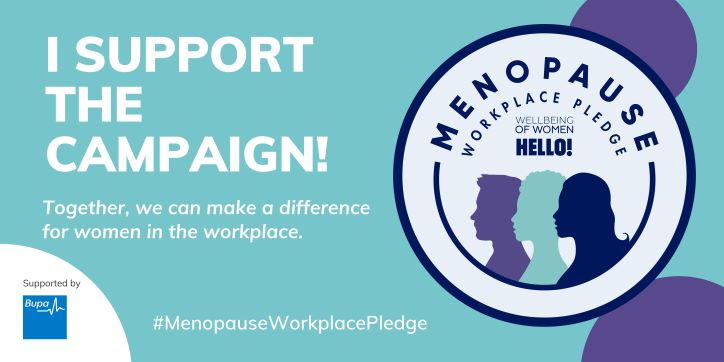The Menopause Workplace Pledge
The University is committed to supporting staff who are experiencing symptoms of the menopause, or those who are affected by colleagues or loved-ones going through this transitional period, which is why we signed up to the Menopause Workplace Pledge.

On this page:
- What is the menopause?
- Why supporting the menopause is a workplace issue
- Menopause Support available at Huddersfield University
- Guidance for line managers supporting employees through the menopause
- Where to get further support and information
What is the menopause?
The menopause is a natural part of ageing that usually occurs between 45 and 55 years of age as oestrogen levels decline leading to the end of the menstrual cycle. It can also happen earlier or later in someone's life and affects anyone with a menstrual cycle, inclusive of trans and non-binary people.
The menopause can cause many symptoms ranging from mild to very severe. It's not just hot flushes! Anxiety, 'brain fog', sleeping difficulties, headaches, muscle and joint pain, lack of concentration and panic attacks are a few examples, but there are many, many more. For many people symptoms last about 4 years, but in some cases, symptoms can last a lot longer.
Some people might also experience early menopause or go through medical menopause earlier in their lives i.e., due to a surgery such as a hysterectomy. Around 1 in 100 women experience premature menopause (before age 40).
A great place to find more information and resources if you are currently experiencing the menopause is the website Henpicked. They have a fantastic resource available to download that provides a practical 3 stage framework - Managing Your Menopause . We really recommend checking it out.
Why is supporting the menopause in the workplace important?
Experiencing menopause symptoms can pose a challenge as people go about their daily lives, including at work. A bad night’s sleep can affect concentration, for example, while heavy periods or hot flushes can be physically distressing and embarrassing in front of colleagues or clients (Brewis et al 2017).
Research shows that 3 in 5 employees experiencing menopause transition believe their symptoms have a negative impact on them at work (CIPD 2019), and many women leave their jobs, reduce their hours or pass up promotions, because of their menopausal symptoms.
Therefore, supporting the menopause at work like any other long term health condition, including making reasonable adjustments, is important to help employees to stay well at work and feel that they can remain in their employment.
Equally, the university has a duty of care to its employees under both the Equality Act 2010, which protects workers against discrimination, and the Health and Safety at Work Act 1974, which says an employer must, where reasonably practical, ensure everyone's health, safety, and welfare at work.

Menopause Support at Huddersfield University

Menopause Talk & Support Group
A friendly and welcoming staff peer support group that meets monthly, both online and in person.

Menopause Support Teams Group
Join our Microsoft Teams Menopause Support Group.

Occupational Health
If you feel you need additional support to help you manage the menopause at work and to discuss any reasonable adjustments, you can get in touch with the Occupational Health team for further information.
Guidance for line managers
If you are a line manager supporting a staff member through the menopause, there are several places to get guidance and support:
- Contact the Occupational Health department here
- CIPD have produced an excellent resource 'A Guide to Managing Menopause at Work: Guidance for Line Managers'
- The organisation Henpicked also have a fantastic guide for line managers that can be accessed here - Menopause Line Manager Guide
Further Menopause Information and Support
You may find these additional resources useful to help cope with the menopause
